Nathan J. Szymanski
Thermodynamic assessment of machine learning models for solid-state synthesis prediction
Feb 03, 2026Abstract:Machine learning models have recently emerged to predict whether hypothetical solid-state materials can be synthesized. These models aim to circumvent direct first-principles modeling of solid-state phase transformations, instead learning from large databases of successfully synthesized materials. Here, we assess the alignment of several recently introduced synthesis prediction models with material and reaction thermodynamics, quantified by the energy with respect to the convex hull and a metric accounting for thermodynamic selectivity of enumerated synthesis reactions. A dataset of successful synthesis recipes was used to determine the likely bounds on both quantities beyond which materials can be deemed unlikely to be synthesized. With these bounds as context, thermodynamic quantities were computed using the CHGNet foundation potential for thousands of new hypothetical materials generated using the Chemeleon generative model. Four recently published machine learning models for synthesizability prediction were applied to this same dataset, and the resultant predictions were considered against computed thermodynamics. We find these models generally overpredict the likelihood of synthesis, but some model scores do trend with thermodynamic heuristics, assigning lower scores to materials that are less stable or do not have an available synthesis recipe that is calculated to be thermodynamically selective. In total, this work identifies existing gaps in machine learning models for materials synthesis and introduces a new approach to assess their quality in the absence of extensive negative examples (failed syntheses).
Establishing baselines for generative discovery of inorganic crystals
Jan 04, 2025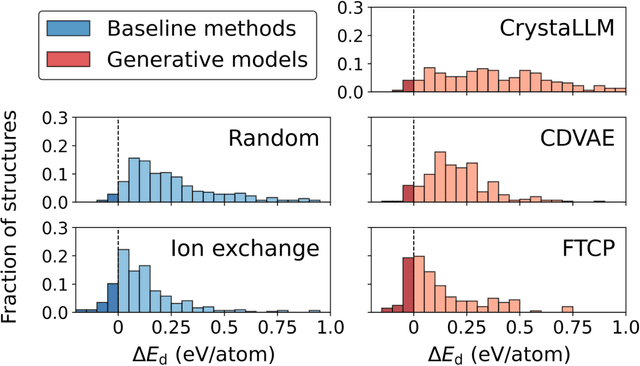

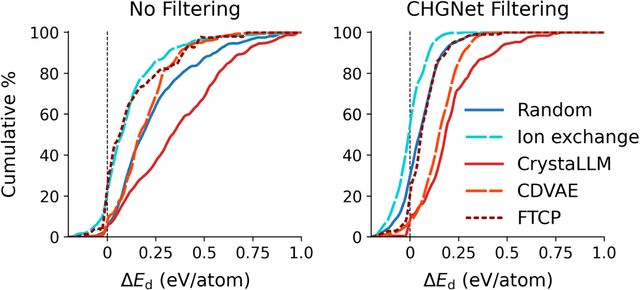

Abstract:Generative artificial intelligence offers a promising avenue for materials discovery, yet its advantages over traditional methods remain unclear. In this work, we introduce and benchmark two baseline approaches - random enumeration of charge-balanced prototypes and data-driven ion exchange of known compounds - against three generative models: a variational autoencoder, a large language model, and a diffusion model. Our results show that established methods such as ion exchange perform comparably well in generating stable materials, although many of these materials tend to closely resemble known compounds. In contrast, generative models excel at proposing novel structural frameworks and, when sufficient training data is available, can more effectively target properties such as electronic band gap and bulk modulus while maintaining a high stability rate. To enhance the performance of both the baseline and generative approaches, we implement a post-generation screening step in which all proposed structures are passed through stability and property filters from pre-trained machine learning models including universal interatomic potentials. This low-cost filtering step leads to substantial improvement in the success rates of all methods, remains computationally efficient, and ultimately provides a practical pathway toward more effective generative strategies for materials discovery.
AlabOS: A Python-based Reconfigurable Workflow Management Framework for Autonomous Laboratories
May 22, 2024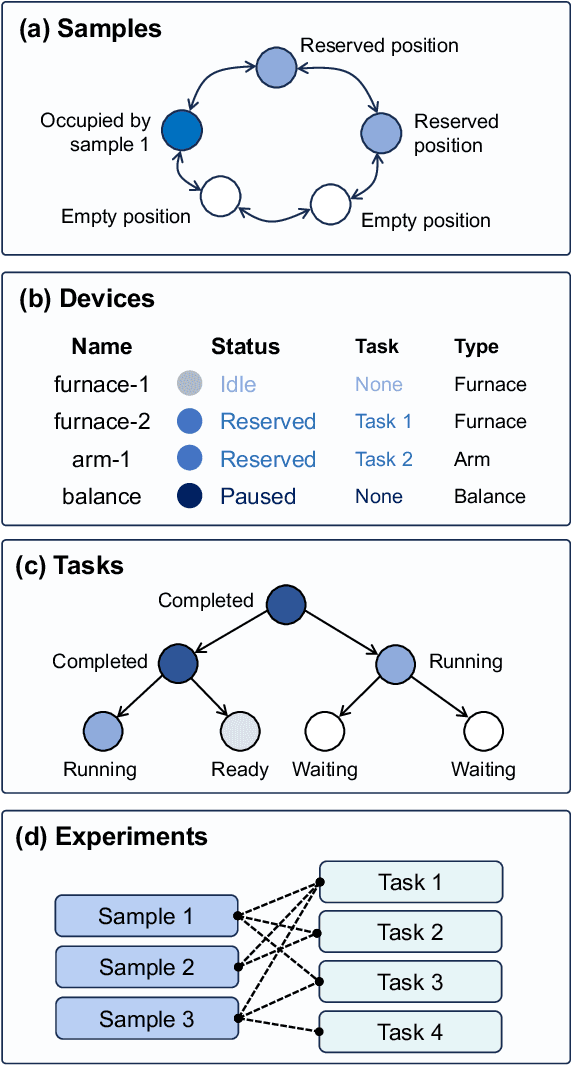
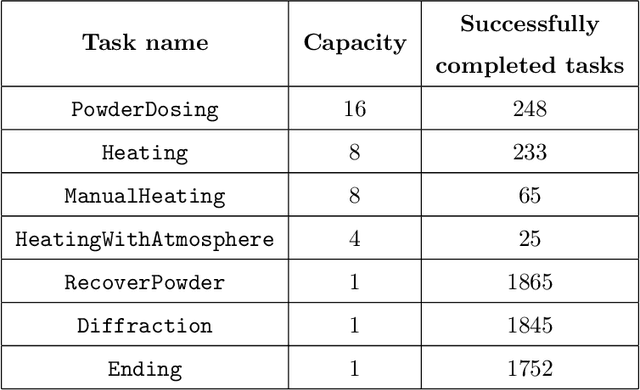
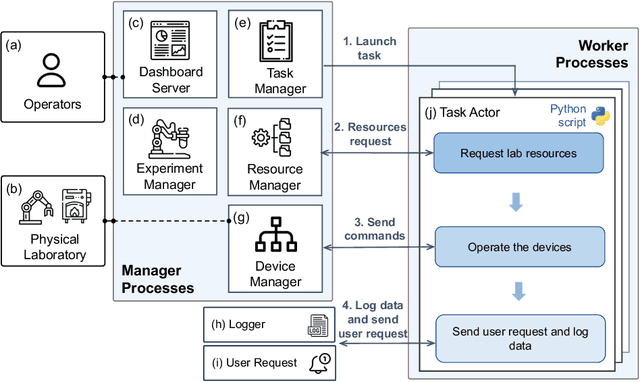
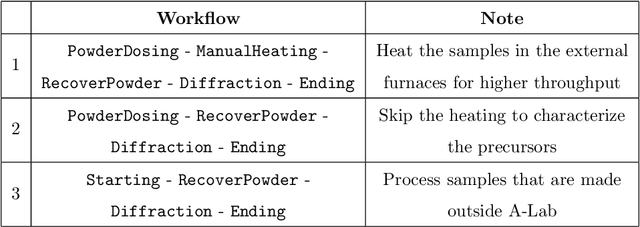
Abstract:The recent advent of autonomous laboratories, coupled with algorithms for high-throughput screening and active learning, promises to accelerate materials discovery and innovation. As these autonomous systems grow in complexity, the demand for robust and efficient workflow management software becomes increasingly critical. In this paper, we introduce AlabOS, a general-purpose software framework for orchestrating experiments and managing resources, with an emphasis on automated laboratories for materials synthesis and characterization. We demonstrate the implementation of AlabOS in a prototype autonomous materials laboratory. AlabOS features a reconfigurable experiment workflow model, enabling the simultaneous execution of varied workflows composed of modular tasks. Therefore, AlabOS is well-suited to handle the rapidly changing experimental protocols defining the progress of self-driving laboratory development for materials research.
A universal synthetic dataset for machine learning on spectroscopic data
Jun 14, 2022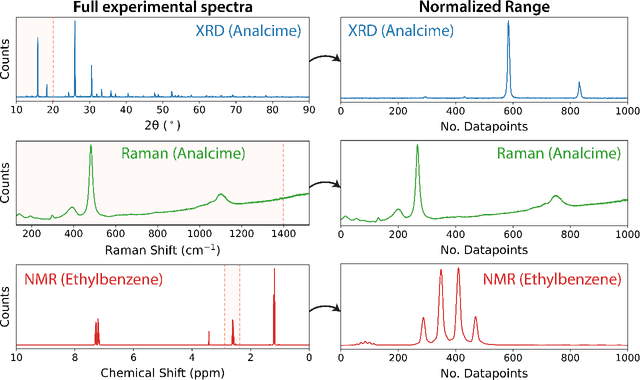

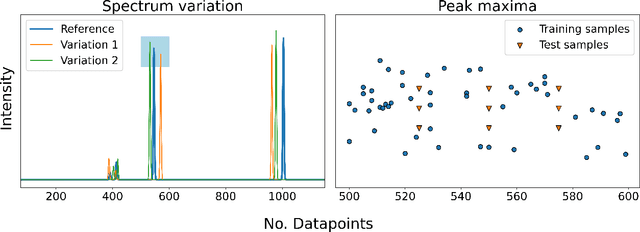
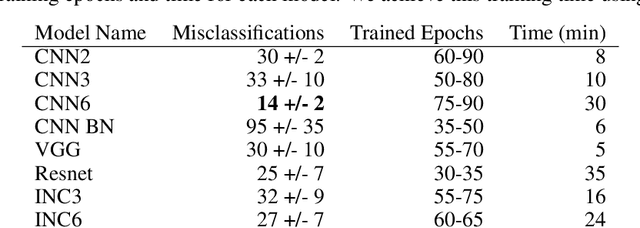
Abstract:To assist in the development of machine learning methods for automated classification of spectroscopic data, we have generated a universal synthetic dataset that can be used for model validation. This dataset contains artificial spectra designed to represent experimental measurements from techniques including X-ray diffraction, nuclear magnetic resonance, and Raman spectroscopy. The dataset generation process features customizable parameters, such as scan length and peak count, which can be adjusted to fit the problem at hand. As an initial benchmark, we simulated a dataset containing 35,000 spectra based on 500 unique classes. To automate the classification of this data, eight different machine learning architectures were evaluated. From the results, we shed light on which factors are most critical to achieve optimal performance for the classification task. The scripts used to generate synthetic spectra, as well as our benchmark dataset and evaluation routines, are made publicly available to aid in the development of improved machine learning models for spectroscopic analysis.
A probabilistic deep learning approach to automate the interpretation of multi-phase diffraction spectra
Mar 30, 2021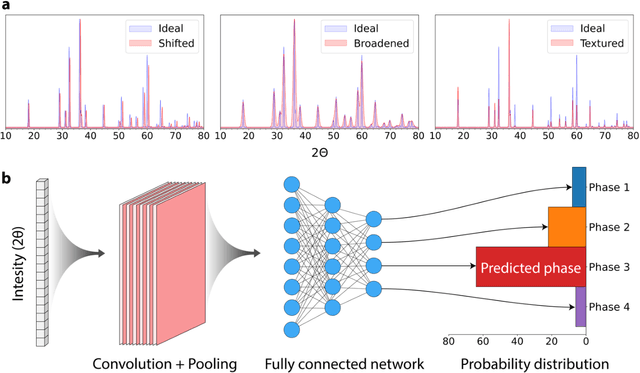
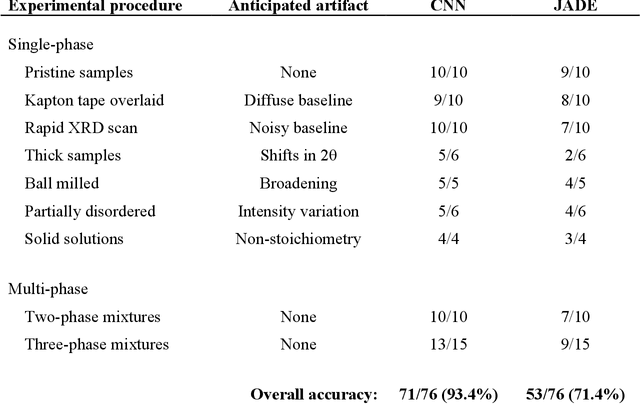
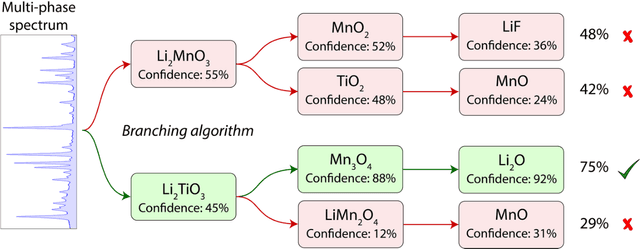
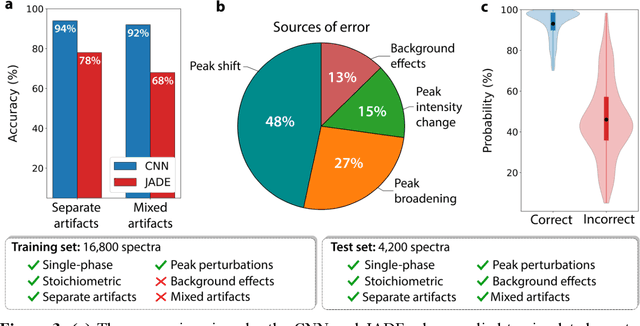
Abstract:Autonomous synthesis and characterization of inorganic materials requires the automatic and accurate analysis of X-ray diffraction spectra. For this task, we designed a probabilistic deep learning algorithm to identify complex multi-phase mixtures. At the core of this algorithm lies an ensemble convolutional neural network trained on simulated diffraction spectra, which are systematically augmented with physics-informed perturbations to account for artifacts that can arise during experimental sample preparation and synthesis. Larger perturbations associated with off-stoichiometry are also captured by supplementing the training set with hypothetical solid solutions. Spectra containing mixtures of materials are analyzed with a newly developed branching algorithm that utilizes the probabilistic nature of the neural network to explore suspected mixtures and identify the set of phases that maximize confidence in the prediction. Our model is benchmarked on simulated and experimentally measured diffraction spectra, showing exceptional performance with accuracies exceeding those given by previously reported methods based on profile matching and deep learning. We envision that the algorithm presented here may be integrated in experimental workflows to facilitate the high-throughput and autonomous discovery of inorganic materials.
 Add to Chrome
Add to Chrome Add to Firefox
Add to Firefox Add to Edge
Add to Edge